Analysing juvenile crime rates in Kerala: Causes, Social impacts, and Islamic parenting as a Solution
Kerala has been deeply affected by a recent wave of horrific crimes, including mass murders, suicides, and rampant drug abuse in children, which challenge the core social values of this so-called literate state. Not long ago, a farewell party descended into a cold-blooded murder of a 10th-grade student, Shahbas, at the hands of his peers. These crimes have reached big numbers, especially involving minors. How has the mentality of students turned so violent at an age when learning, compassion, and respect should be supreme? When did our children abandon the social, moral, and ethical values? Who is to blame for the escalating criminal mindset among minors?
This cannot be viewed solely as an isolated incident. There have been numerous similar situations where the anger of young students has escalated to significant crimes. For example, in April 2020, a 16-year-old boy was violently murdered by his friends in Pathanamthitta, and another case involved two minors engaged in drug trafficking and assaulting police officers with air guns (Krishnachand, K. 2021, October 30). These events highlight a troubling trend of increasing criminal behaviour among minors in the state. Police records indicate that more than 300 cases against minors are filed annually in Kerala (Tom, D. 2021, September 27). Alarmingly, the level of violence in these incidents seems to be escalating, with children showing little fear of beating someone to death or the legal repercussions that follow.
We cannot blame the children before analysing the digital dilemma and social media unrest that this age presents to them to a significant degree. We should be mindful of what social media is exposing our children to. The post-pandemic era has profoundly impacted the mental health and conscience of children through unfiltered, explicit, and violent content on social media platforms. Children who grow up witnessing this violence and negativity tend to internalise it and gradually adapt to it. They perceive ragging and bullying in filmographic content as manifestations of masculinity and assume it to be reality. Conversely, we could utilise the same social media to promote positivity and social values that would enhance their lives. According to the Women and Child Rights and Protection Commission, 15,261 children underwent counselling for mobile phone addiction and behavioural disorders in 2023 (Babu, K. A. 2025, February 23) This represents only a small percentage of social media victims who have recognised their problem; the majority remain unaware of their addiction to these devices and the need for help.
Social media is not the primary culprit of increased crime among minors. Drug dealing has become more prevalent in schools than before. According to the police intelligence agency, 1057 schools, including aided schools, are involved in severe drug chains and trafficking (Kerala Kaumudi, 2023, June 5). They intend to keep children trapped in the deadly poison of narcotics forever. 70% of drug usage in schools begins between the ages of 10 and 15. Children exposed to drugs at this age are more likely to develop behavioural issues, stress, and mental disease, which can lead to severe crimes and acts of violence. 3600 pupils in the state sought counselling for severe addiction.
Social media addiction and increasing drug usage can be apparent reasons for juvenile crime rates, although broken families and poor parenting are undeniable. In social science, criminal behaviour is intimately linked to broken families, as well as a lack of social involvement and activity. Counsellors and sociologists point out that every adolescent crime stems from a damaged household. According to the Women and Child Development Department, 2274 juveniles were counselled for illegal activities in 2024, and it was discovered that 91% of the youngsters had troubled homes or poor parenting, rather than a criminal background (Babu, K. A. 2025, February 23)
This notion is supported by social disorganisation theory, which states that the breakdown of social connections causes an increase in crime and delinquency. Communities with weak social ties have higher crime rates. A fractured family shatters the relationship and isolates the person from social control. Because of the freedom and lack of social supervision, he or she feels free to violate the rules and commit crimes. The Childline Commission's former acting chairman, Adv. Naseer Chaliyam acknowledges that the majority of juvenile cases during his tenure had a shattered familial background. Here lies the significance of Islamic parenting as the ultimate solution to these issues by adhering to Shariah principles and keeping a healthy relationship with family members while causing no harm to society or the child's mental health.
Islamic paradigm of parenting
In Islam, children are Allah's gift and Amanah (trust), and it is the responsibility of parents to guide them on the straight path. Parenting is more than only developing your child for a brighter future; it has the potential to enhance Deen by instilling good Tharbiyah and Islamic ideals in them. It's like passing Deen and Iman along through your offspring to future generations. If a parent succeeds in fulfilling their task of developing a deep connection to Islam and God in their children, they will not disobey, cause harm, or engage in any criminal actions.
Moreover, there still pertains a misconception that parenting starts from the birth of a baby, but in fact, in Islam, preparation for the presence of children has begun since the selection of a life partner. It’s a long-rooted process that starts from the time you select your spouse. One must select a spouse who will be the best to raise their kids in compliance with the social and moral values of Islam. And after that, make sincere duas for offspring that will be joy for the eyes, just like how Allah (swt) states Prophet Ibrahim’s (As) dua for a righteous offspring who will befriend in the almighty’s path.
A statement is often circulated regarding the stages of a child’s upbringing: “Play with your child for seven years, discipline him for seven years, befriend him for seven years, then give him freedom.” Some works on child education attribute this saying to ʿUmar ibn al-Khaṭṭāb رضي الله عنه, while others present it more generally as a report from some of the Salaf. However, scholars have noted that its attribution to ʿUmar رضي الله عنه is not established with certainty. Despite the question over its chain of transmission, the statement conveys a wise approach to Tarbiyah, nurturing love and warmth in the early years, followed by disciplined guidance, and finally companionship that fosters mutual respect.
The first seven years (ages 0–7) are the formative years, when a child’s heart is most open to love, warmth, and emotional security. This is the time to nurture them through play, affection, and gentle guidance, laying a foundation of trust that will make later instruction easier and more effective.
The next seven years (ages 7–14) mark a key developmental stage, when children are ready to seek knowledge and make sense of their surroundings. At this stage, they are like sponges, absorbing whatever they see and hear. Be mindful of your own actions, for much of what you do will influence them more than what you say.
The final seven years (ages 14–21) usher in a phase of greater independence. Once your child reaches 14, or the age of puberty, they begin to shape their own identity and exercise freedom in decision-making. In Islam, they are considered accountable adults. During these crucial years, befriend them, guide them, and offer sincere advice. Understand that their choices, right or wrong, are now theirs to make; your role as a parent is to remain a wise counsellor and a supportive presence.
In Islam, parenting is a significant subject addressed throughout the Qur’an and the prophetic ḥadīth, providing a comprehensive guide on how parents should nurture and guide their children. Remarkably, this guidance is not presented as rigid instructions, but through living examples and real-life accounts — such as the stories of Luqmān عليه السلام and his son, Yaʿqūb عليه السلام and his sons, and Nūḥ عليه السلام and his son — illustrating both the responsibilities and boundaries of parenthood.
In the case of Luqmān عليه السلام, Allah has dedicated an entire sūrah in the Qur’an to him. Within it, Luqmān engages directly in parenting, offering his son wise counsel on various matters. His example serves as a timeless model for new parents, showing how to advise children with calmness, kindness, and clarity, rather than issuing unexplained commands. Through Luqmān’s words, Allah highlights some of the most essential lessons we must instil in our children.
In the example of Yaʿqūb عليه السلام and his sons, Allah illustrates the limits of parental influence: despite his exceptional care and guidance, some of his sons still disobeyed him. A similar lesson appears in the story of Nūḥ عليه السلام and his son, when the Prophet called upon his son to believe in Allah and board the Ark during the great flood. His son refused and perished among the disbelievers. These accounts show that even prophets had limited control over their children beyond providing sincere advice and guidance.
New parents, therefore, should recognise that their role is to nurture, guide, and keep their children on the right path, knowing that parental authority gradually decreases as children grow and ends when they reach adulthood.
In short, the Islamic parenting model lays the foundation for a strong and healthy family bond. Its essence lies in adhering to the Dīn and imparting authentic Islamic values to the next generation, ensuring a brighter future. Instilling such values is the surest way to protect young people from the pitfalls of drugs, crime, and moral decline — while parents must fulfil their duty of guidance and entrust the outcome to Allah.
About the author:
Ajmal K. I. is a research scholar at Darul Huda Islamic University in the Department of Aqidah and Philosophy. Alongside, he is pursuing a Bachelor’s degree in History at IGNOU. He has served as a cover story columnist and editor for three years in The Guide magazine.
References
Krishnachand, K. (2021, October 30). More children into crimes: Cases of juvenile delinquency have been increasing across Kerala. The New Indian Express. https://www.newindianexpress.com/states/kerala/2021/oct/30/more-childreninto-crimescases-of-juvenile-delinquency-have-been-increasing-across-kerala-2377411.html
Tom, D. (2021, September 27). 434 juveniles nabbed in Kerala for various offences in 2020. The Times of India. https://timesofindia.indiatimes.com/city/kochi/434-juveniles-nabbed-in-kerala-for-various-offences-in-2020/articleshow/86544284.cms
Kerala Kaumudi. (2023, June 5). 1057 schools under the drug mafia. Kerala Kaumudi. https://keralakaumudi.com/en/news/mobile/news.php?id=1081251
Babu, K. A. (2025, February 23). Is your child addicted to mobile phones? Over 15,000 Kerala kids were treated—protect yours now. Mathrubhumi (English). https://english.mathrubhumi.com/news/kerala/excessive-mobile-phone-use-kerala-children-needed-mental-health-treatment-916da1f7
Tribune Web Desk. (2025, March 5). Digital detox: 385 kids freed from screen addiction in Kerala. The Tribune. https://www.tribuneindia.com/news/india/digital-detox-385-kids-freed-from-screen-addiction-in-kerala-472765
Mathrubhumi News Desk. (2025, March 3). 30 of 63 murders in the last two months linked to substance abuse: Kerala Police. Mathrubhumi (English). https://english.mathrubhumi.com/news/crime/kerala-police-reveals-substance-abuse-linked-to-63-murders-in-state-7c941bbd
John, J., John, S., & Raghunadhan, T. (2020). Role of media in augmenting violence in adolescent youth: An Indian perspective. Journal of New Media and Mass Communication, 6(1), 12–19. https://doi.org/10.18488/journal.91.2020.61.12.19
Rathinabalan, I., & Naaraayan, S. A. (2017). Effect of family factors on juvenile delinquency. International Journal of Contemporary Pediatrics, 4(6), 2079–2082. https://doi.org/10.18203/2349-3291.ijcp20174735
Sultan, S., & Awad, N. (2023). Islamic parenting strategies: How to help children feel safe in their attachment to God and parents. Yaqeen Institute for Islamic Research. Retrieved from https://yaqeeninstitute.org/read/paper/islamic-parenting-strategies-how-to-help-children-feel-safe-in-their-attachment-to-god-and-parents
CPS Global. (n.d.). The upbringing of children. In Islamic Parenting: Nurturing Your Child’s True Potential. Retrieved April 29, 2025, from https://www.cpsglobal.org/books/islamic-parenting-nurturing-your-childs-true-potential/the-upbringing-of-children
Disclaimer
The views expressed in this article are the author’s own and do not necessarily mirror Islamonweb’s editorial stance.

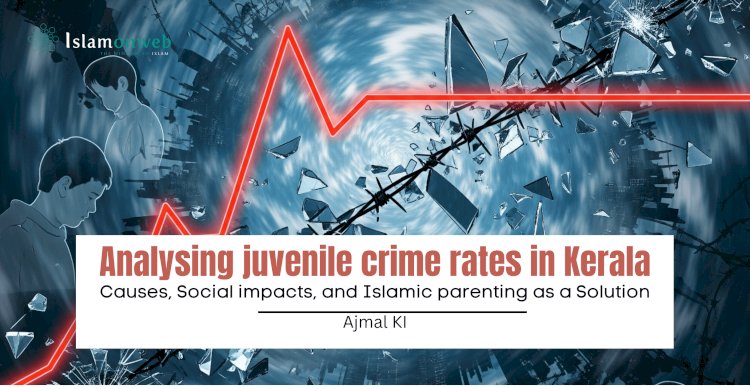


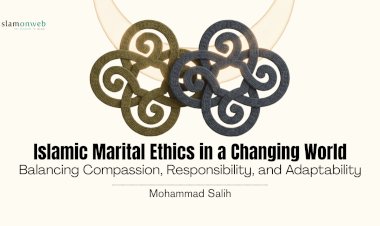
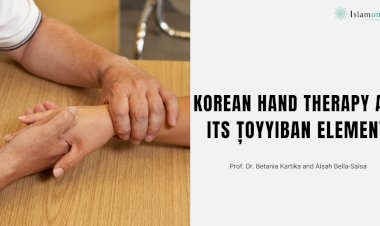
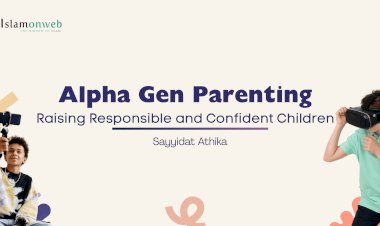

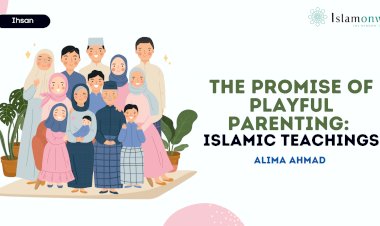
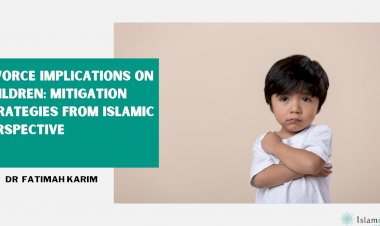














Leave A Comment